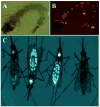Gene expression studies in mosquitoes
- PMID: 19161831
- PMCID: PMC2798853
- DOI: 10.1016/S0065-2660(08)00802-X
Gene expression studies in mosquitoes
Abstract
Research on gene expression in mosquitoes is motivated by both basic and applied interests. Studies of genes involved in hematophagy, reproduction, olfaction, and immune responses reveal an exquisite confluence of biological adaptations that result in these highly-successful life forms. The requirement of female mosquitoes for a bloodmeal for propagation has been exploited by a wide diversity of viral, protozoan and metazoan pathogens as part of their life cycles. Identifying genes involved in host-seeking, blood feeding and digestion, reproduction, insecticide resistance and susceptibility/refractoriness to pathogen development is expected to provide the bases for the development of novel methods to control mosquito-borne diseases. Advances in mosquito transgenesis technologies, the availability of whole genome sequence information, mass sequencing and analyses of transcriptomes and RNAi techniques will assist development of these tools as well as deepen the understanding of the underlying genetic components for biological phenomena characteristic of these insect species.
Figures

References
-
- Abraham EG, Islam S, Srinivasan P, Ghosh AK, Valenzuela JG, Ribeiro JM, Kafatos FC, Dimopoulos G, Jacobs-Lorena M. Analysis of the Plasmodium and Anopheles transcriptional repertoire during ookinete development and midgut invasion. J Biol Chem. 2004;279:5573–5580. - PubMed
-
- Abraham EG, Donnelly-Doman M, Fujioka H, Ghosh A, Moreira L, Jacobs-Lorena M. Driving midgut-specific expression and secretion of a foreign protein in transgenic mosquitoes with AgAperl regulatory elements. Insect Mol Biol. 2005;14:271–279. - PubMed
-
- Adelman ZN, Jasinskiene N, James AA. Development and applications of transgenesis in the yellow fever mosquito, Aedes aegypti. Mol Biochem Parasitol. 2002;121:1–10. - PubMed
-
- Adelman ZN, Jasinskiene J, Vally KJM, Peek C, Travanty EA, Olson KE, Brown SE, Stephens JL, Knudson DL, Coates CJ, James AA. Formation and loss of large, unstable tandem arrays of the PiggyBac transposable element in the yellow fever mosquito, Aedes aegypti. Transgenic Res. 2004;13:411–425. - PubMed

